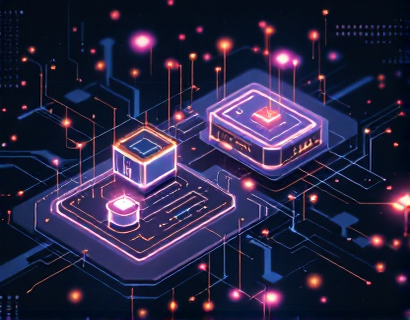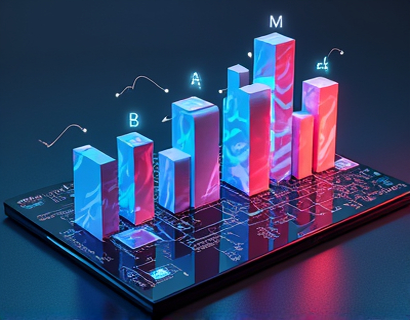Blockchain Oracle Management: Optimizing Data Integration and Smart Contract Execution for Developers and Businesses
In the rapidly evolving landscape of blockchain technology, the role of oracles emerges as a critical component for connecting decentralized applications (DApps) with external data sources. Oracles serve as bridges, providing real-time data and enabling smart contracts to interact with the off-chain world. However, managing these oracles efficiently remains a challenge for developers and businesses aiming to harness the full potential of blockchain. This article delves into innovative software solutions that revolutionize oracle management and blockchain service access, focusing on optimizing data integration and enhancing smart contract capabilities.
Understanding Oracle Management
Oracle management involves the process of integrating external data feeds into blockchain networks, ensuring that smart contracts have access to accurate and timely information. This is crucial for applications that rely on real-world data, such as financial services, supply chain management, and IoT devices. Traditional oracle solutions often suffer from issues like data latency, security vulnerabilities, and limited scalability, which can undermine the reliability and efficiency of DApps.
Challenges in Oracle Management
One of the primary challenges in oracle management is ensuring data integrity and security. Oracles must verify the authenticity and accuracy of data before feeding it into smart contracts. Any compromise in this process can lead to incorrect contract executions, resulting in financial losses or operational failures. Additionally, the decentralized nature of blockchain requires oracles to operate across multiple nodes, adding complexity to data aggregation and validation.
Scalability is another significant issue. As the number of DApps grows, the demand for real-time data increases exponentially. Traditional oracle solutions often struggle to handle high volumes of data requests, leading to delays and increased transaction costs. This can hinder the adoption of blockchain technology in industries where speed and efficiency are paramount.
Innovative Software Solutions for Oracle Management
To address these challenges, several innovative software solutions have emerged, focusing on streamlining oracle management and enhancing the overall blockchain ecosystem. These solutions leverage advanced technologies such as machine learning, decentralized networks, and cryptographic protocols to provide robust and scalable oracle services.
Decentralized Oracle Networks
Decentralized oracle networks are designed to mitigate the risks associated with centralized oracle providers. By distributing data collection and validation across multiple nodes, these networks ensure that no single point of failure can compromise the entire system. Each node in the network independently verifies and aggregates data, reducing the risk of manipulation and increasing data reliability.
These networks often employ incentive mechanisms to encourage nodes to provide accurate and timely data. For instance, nodes that consistently deliver high-quality data receive rewards, while those that fail to meet standards are penalized. This gamification approach not only enhances data integrity but also fosters a community-driven model that aligns the interests of all participants.
Machine Learning for Data Prediction and Validation
Machine learning algorithms play a pivotal role in enhancing the capabilities of oracle management systems. By analyzing historical data patterns, these algorithms can predict future data points with high accuracy. This is particularly useful for applications that require forecasting, such as financial markets or weather monitoring.
Moreover, machine learning can be used to detect anomalies and outliers in data streams, ensuring that only valid and relevant information is fed into smart contracts. This not only improves data quality but also reduces the computational load on the blockchain network by filtering out unnecessary or erroneous data.
Real-Time Data Aggregation and Synchronization
Real-time data aggregation is essential for applications that require up-to-the-minute information. Innovative oracle management solutions use peer-to-peer (P2P) networks and distributed ledger technology to synchronize data across multiple sources simultaneously. This ensures that smart contracts have access to the most current data without significant delays.
These solutions often incorporate caching mechanisms to reduce the load on the blockchain network. By storing frequently accessed data locally, the system can respond more quickly to contract execution requests, thereby improving overall performance and user experience.
Benefits of Advanced Oracle Management
The implementation of advanced oracle management solutions brings numerous benefits to developers and businesses. Firstly, it enhances the security and reliability of smart contracts by ensuring that they operate with accurate and tamper-proof data. This is crucial for applications in sensitive domains such as finance, healthcare, and governance.
Secondly, these solutions improve the scalability of blockchain networks by optimizing data handling and reducing transaction costs. Efficient data aggregation and synchronization minimize the number of blockchain transactions required, leading to lower gas fees and faster processing times.
For businesses, advanced oracle management translates into reduced operational complexity and increased trust in blockchain-based systems. Companies can integrate blockchain technology into their core operations with greater confidence, knowing that their data sources are secure and reliable. This, in turn, can drive innovation and open up new revenue streams.
Case Studies and Real-World Applications
Several industries have already begun to leverage advanced oracle management solutions to transform their operations. In the financial sector, for example, decentralized lending platforms use real-time data from credit bureaus and market indicators to assess loan risks and set interest rates dynamically. This not only enhances the accuracy of risk assessments but also enables faster loan processing.
In supply chain management, oracle-managed DApps can track the movement of goods in real-time, ensuring transparency and traceability. By integrating data from IoT devices and logistics providers, these applications can optimize inventory levels, reduce fraud, and improve customer satisfaction.
Another notable application is in the realm of digital identity verification. Oracle-managed systems can aggregate data from various identity providers, ensuring that user identities are verified and up-to-date. This is particularly valuable for cross-border transactions and KYC (Know Your Customer) processes, where accuracy and security are paramount.
Future Trends in Oracle Management
The future of oracle management is poised for further innovation, driven by advancements in technology and the growing demand for decentralized solutions. One emerging trend is the integration of oracle services with Web3 frameworks, enabling seamless interaction between DApps and external data sources.
Another area of focus is the development of cross-chain oracle solutions, which can aggregate data from multiple blockchain networks. This interoperability will facilitate the creation of more complex and interconnected decentralized ecosystems, breaking down silos and enhancing the overall utility of blockchain technology.
Additionally, the rise of autonomous organizations (DAOs) will likely drive the need for more sophisticated oracle management systems. DAOs require robust data feeds to make collective decisions, and advanced oracle solutions will play a critical role in supporting these decentralized governance models.
Conclusion
In conclusion, the optimization of oracle management is essential for the widespread adoption and success of blockchain technology. By addressing the challenges of data integrity, security, and scalability, innovative software solutions are paving the way for more reliable and efficient decentralized applications. Developers and businesses that embrace these advancements can unlock the full potential of blockchain, driving innovation and creating new opportunities in a rapidly evolving digital landscape.










































